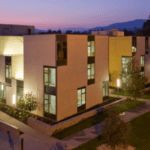Ivy League Schools in New Hampshire: Does New Hampshire Have Ivies?
What’s Covered:
- Are there Ivy League Schools in New Hampshire?
- Key Facts About Dartmouth College
- Top 10 Non-Ivy League Schools in New Hampshire
- What Are Your Chances of Acceptance?
Navigating the intricate landscape of college admissions can be both exhilarating and daunting. From the hallowed halls of the Ivy League’s Dartmouth College to the dynamic campuses of public and private institutions, New Hampshire boasts a plethora of opportunities for aspiring students. In this guide, we’ll delve into the top colleges in New Hampshire, providing insights into their academic offerings, admissions statistics, and unique characteristics.
Are there Ivy League Schools in New Hampshire?
Yes, New Hampshire is home to one Ivy League institution: Dartmouth College. The term “Ivy League” originally referred to an athletic conference, but over time, it has become synonymous with a group of elite and prestigious universities in the U.S., all of which are located in the Northeast and Mid-Atlantic regions. Dartmouth College, founded in 1769, is among these institutions.
Key Facts About Dartmouth College
Dartmouth College is renowned for its highly selective admissions process. With an acceptance rate of just 6%, it is clear that the institution admits only a fraction of its applicants. Those aspiring to be a part of Dartmouth’s academic community must demonstrate exceptional academic prowess, leadership qualities, creativity, and a commitment to the community.
Dartmouth consistently secures its place among the top 20 national universities. Its demanding admissions process is indicative of its unwavering commitment to academic excellence. The institution particularly emphasizes academic performance, often favoring applicants who not only have high GPAs, but also rank near or at the pinnacle of their class.
Admissions
Location: Hanover, NH
Undergrad Enrollment: 4,500
Acceptance Rate: 6%
Middle 50% SAT: 1440-1560
Middle 50% ACT: 33-35
CollegeVine ranks Dartmouth College as one of the premier institutions in the nation. Dartmouth’s competitive nature is evident from its stringent standardized test score requirements, making it one of the more challenging Ivy League schools to gain admission to.
The probability of being admitted to Dartmouth varies based on the strength of an applicant’s profile. While Dartmouth doesn’t have distinct schools like engineering or arts within its undergraduate program as Columbia does, the emphasis on holistic admissions means various aspects of an applicant’s profile are critically evaluated.
Much like its Ivy League counterparts, Dartmouth highly values academic prowess. The college also appreciates students who have showcased excellence across diverse fields, embodying both STEM and humanities strengths.
For potential Dartmouth students, crafting a compelling essay is crucial. Dartmouth seeks essays that are personal, insightful, and engaging. For guidance on creating standout essays, applicants might consider reviewing resources or guides specific to Dartmouth’s essay prompts.
Location
Dartmouth is located in Hanover, New Hampshire, a quintessential New England town. The college is often praised for its idyllic setting, surrounded by picturesque forests and the Connecticut River. Despite its rural location, Hanover offers a vibrant cultural and social scene, largely centered around the college. Students often highlight the strong sense of community and the close-knit nature of the Dartmouth student body, which is enhanced by the town’s intimate setting.
Academics
Dartmouth College is renowned for its rigorous academic programs and its commitment to cultivating curious and well-rounded thinkers. The college’s undergraduate curriculum is rooted in the liberal arts, ensuring that students are exposed to a diverse array of subjects before they specialize.
Dartmouth’s distinctive D-Plan, a quarter-based academic calendar, empowers students with the autonomy to design their educational journeys, be it through on-campus courses, immersive off-campus programs, or international experiences.
One of Dartmouth’s standout features is its dedication to undergraduate teaching. Unlike many institutions of its caliber, Dartmouth places undergraduates at the forefront, allowing them to engage directly with distinguished faculty in intimate classroom settings, fostering an environment of mentorship and collaboration.
Financial Aid
At the core of Dartmouth’s ethos is the belief that financial barriers should never hinder deserving students from accessing world-class education. Upholding this principle, Dartmouth practices need-blind admissions for U.S. citizens, permanent residents, and undocumented students, ensuring that financial considerations do not influence admission decisions.
Beyond this, Dartmouth’s commitment to financial accessibility is evident in its promise to meet 100% of the demonstrated financial need of its students. Through a judicious mix of grants, scholarships, work-study opportunities, and minimal loans, Dartmouth strives to make its transformative education accessible to all, ensuring that its graduates can embark on their future endeavors without the weight of substantial debt.
Top 10 Non-Ivy League Schools in New Hampshire
1. St. Anselm College
Location: Manchester, NH
Acceptance Rate: 78%
Undergraduate Enrollment: 2,000
St. Anselm College in Manchester, New Hampshire, was founded in 1889 by the Order of Saint Benedict. Named after the Benedictine monk, Saint Anselm of Canterbury, it’s a private, Roman Catholic liberal arts institution. The 400-acre scenic campus underscores its commitment to faith and learning. Academically, the college offers over 45 majors, with a focus on nursing, business, and political science among others. The dedicated faculty prioritizes critical thinking and ethical reasoning, supported by a low student-to-faculty ratio. St. Anselm also emphasizes undergraduate research and global learning opportunities.
2. University of New Hampshire
Location: Durham, NH
Acceptance Rate: 87%
Undergraduate Enrollment: 12,000
The University of New Hampshire (UNH), established in 1866 in Durham, is the state’s leading public research institution. Offering diverse programs, it’s renowned for engineering, business, and sciences. As an R1 Doctoral University, UNH emphasizes intensive research and hands-on learning. Additionally, it champions sustainability and global student experiences.
3. Magdalen College of the Liberal Arts
Location: Warner, NH
Acceptance Rate: 95%
Undergraduate Enrollment: <200
Magdalen College of the Liberal Arts in Warner, New Hampshire, is a private Catholic institution emphasizing Great Books and the Catholic intellectual tradition. The college’s small size promotes deep student-faculty engagement with classical texts and the arts. Set in scenic New Hampshire, students enjoy outdoor activities and a vibrant liturgical life on campus. The college fosters holistic growth through community, faith, and diverse extracurriculars.
4. Thomas More College of Liberal Arts
Location: Merrimack, NH
Acceptance Rate: 90%
Undergraduate Enrollment: <200
Thomas More College of Liberal Arts in Merrimack, New Hampshire, is a private Catholic institution rooted in the Great Books curriculum and Catholic intellectual tradition. The college’s intimate setting enhances deep discussions on classical texts and humanities. Located in scenic New England, students enjoy outdoor pursuits and a rich spiritual life with regular Mass and sacraments. The college offers diverse extracurriculars, emphasizing holistic student development in intellectual, spiritual, and cultural aspects.
5. University of New Hampshire at Manchester
Location: Manchester, NH
Acceptance Rate: 83%
Undergraduate Enrollment: 700
UNH Manchester is the urban campus of the University of New Hampshire system, located in Manchester’s heart. Merging the resources of a major research university with a smaller institution’s intimacy, it offers students unique real-world opportunities in the city. The campus, set in the historic Pandora Mill, features modern facilities and a rich student life, intertwined with local community engagement. The city’s cultural offerings, from art galleries to theaters, amplify the educational experience, making UNH Manchester a top choice for urban education.
6. Rivier University
Location: Nashua, NH
Acceptance Rate: 84%
Undergraduate Enrollment: 1,000
Rivier University in Nashua, New Hampshire, is a private Catholic institution inspired by the Sisters of the Presentation of Mary. Dedicated to a transformative education, Rivier emphasizes liberal arts and offers programs for both traditional and non-traditional students. The campus, in vibrant Nashua, promotes academic and personal growth, linking students to community-based opportunities. Campus life is diverse, with clubs, athletics, and a deep spiritual foundation. Rivier’s blend of academics, community, and service prepares students for fulfilling careers and purposeful lives.
7. Southern New Hampshire University
Location: Manchester, NH
Acceptance Rate: 92%
Undergraduate Enrollment: 122,000
Southern New Hampshire University (SNHU) is a private, nonprofit institution in Manchester, New Hampshire. Acclaimed for its innovative online programs, it also boasts a lively Manchester campus offering diverse undergraduate and graduate degrees. This campus emphasizes experiential learning, real-world projects, and global experiences. The SNHU Penmen participate in NCAA Division II sports, enhancing campus life, which is further enriched by cultural events and community engagement. SNHU’s dedication to student transformation is seen in its innovative curriculum and inclusive community.
8. Keene State College
Location: Keene, NH
Acceptance Rate: 88%
Undergraduate Enrollment: 3,000
Keene State College in Keene, New Hampshire, is a public liberal arts institution within the University System of New Hampshire. It offers a variety of programs centered on liberal arts and sciences, promoting academic excellence and civic engagement. The campus combines historical allure with modern amenities. Community involvement is key, with many service-learning opportunities. Notably, the college hosts an annual film festival and champions environmental projects, reflecting its commitment to a comprehensive educational experience.
9. Colby-Sawyer College
Location: New London, NH
Acceptance Rate: 93%
Undergraduate Enrollment: 800
Colby-Sawyer College in New London, New Hampshire, is a private liberal arts institution blending New England charm with modern facilities, backed by a legacy of educational excellence. It emphasizes experiential learning and interdisciplinary studies across its undergraduate programs, notably in nursing, business, environmental science, and the arts. The dedicated faculty promotes mentorship and hands-on experiences, integrating theoretical knowledge with practical application. Students often participate in internships, research, and global studies. This fusion of tradition and innovation ensures graduates are equipped for contemporary challenges and impactful contributions.
10. Plymouth State University
Location: Plymouth, NH
Acceptance Rate: 92%
Undergraduate Enrollment: 4,000
Plymouth State University (PSU) in Plymouth, New Hampshire, set against the scenic White Mountains, began as a teachers’ college and has evolved into a diverse university. Offering a wide range of undergraduate and graduate programs, from business to environmental science, PSU blends theory with practical application. Its unique cluster-based learning fosters interdisciplinary collaboration, allowing students to tackle real-world challenges. With its committed faculty and emphasis on research and community involvement, PSU ensures students are well-equipped for future careers and civic contributions.
What Are Your Chances of Acceptance?
While it’s natural to aspire to attend these prestigious institutions, it’s equally important to approach the college application process with a balanced perspective. Crafting a well-rounded school list is vital. This list should include “safety” schools (where your chances of acceptance are relatively high), “target” schools (where your chances are moderate), and “reach” schools (like many of these highly selective institutions). Remember, for the vast majority of students, these elite colleges are considered reach schools, regardless of their credentials.
If you’re curious about your chances of acceptance at specific institutions, consider using CollegeVine’s changing engine. This tool can provide insights based on your profile from factors like GPA, extracurricular activities, and test scores. Having an idea of where you’d fit in best is an important topic to consider during your application process!


